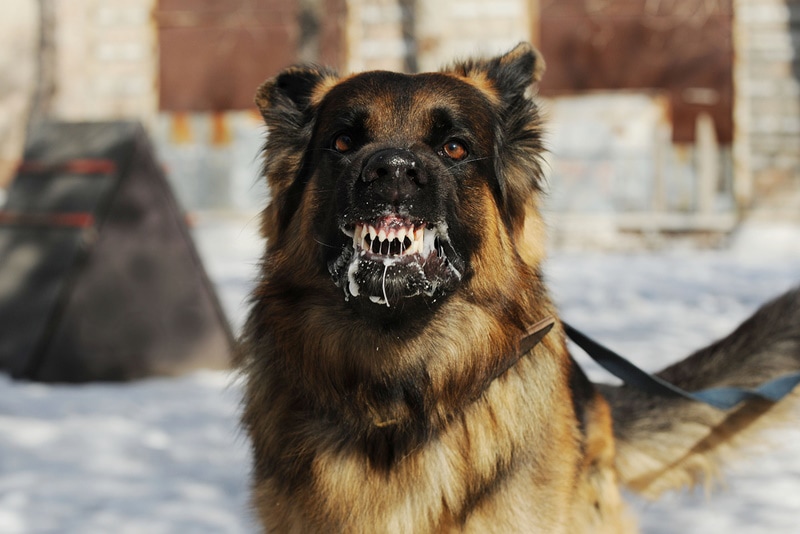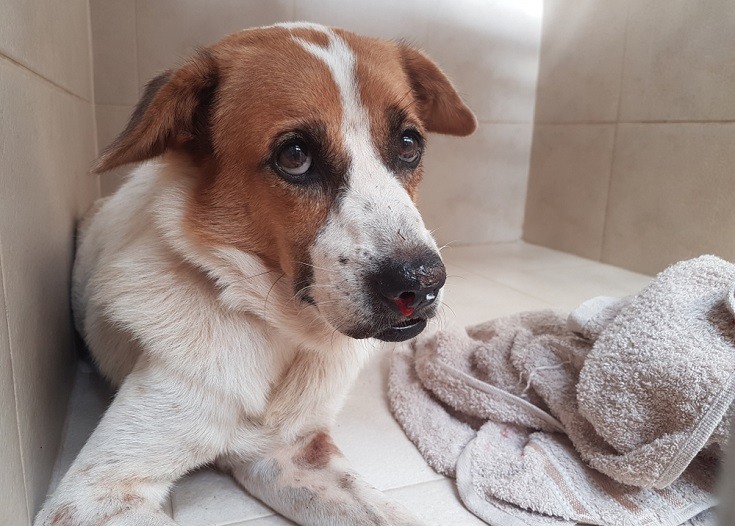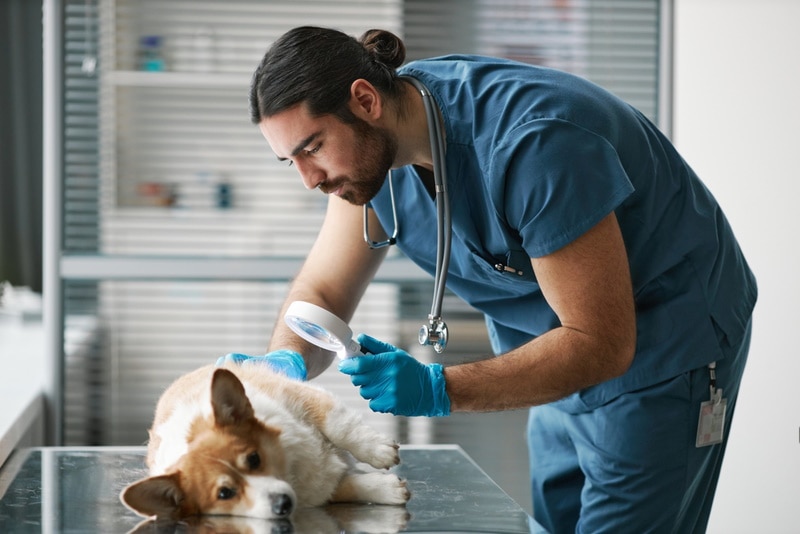7 Neurological Issues in Dogs & Common Signs to Keep in Mind (Vet Approved)

Updated on

The nervous system is responsible for coordinating movement, the senses, bodily functions, endocrine glands, behavior, and much more. It’s made up of the central nervous system, which includes the brain and spinal cord, as well as the peripheral nervous system, made up from nerves throughout the body.
Problems in the nervous system can create numerous issues, from the inability to walk properly or at all, to blindness or circling, depending on the underlying cause. However, there are certain signs that are more common than others and are red flags for nervous system dysfunction. Some of these signs can be hard to pick up on and can be difficult to distinguish from problems in other systems.
Here is a quick discussion of some of the more common neurological disorders that can occur, but this list is not exhaustive or a replacement for veterinary advice.
Nervous System and Common Signs of Illness
The central nervous system includes the brain and the spinal cord. The brain is divided into the brain stem, the cerebrum, and the cerebellum. Each part of the central nervous system has a specific function: the brainstem controls basic life functions, the cerebrum is the center of conscious decision-making, and the cerebellum is responsible for movement and motor control.1 The spinal cord is a tubular structure that runs from the brainstem all the way down to the lower back, to the level of the sixth and seventh lumbar vertebrae.2 The peripheral nervous system consists of the nerves that are found throughout the rest of the body.
Neurological disorders may occur at any level of the nervous system, central or peripheral, and in more than one location. Depending on the location and the underlying cause, there is a vast array of clinical signs that your dog may exhibit.
If the central nervous system is affected in any way, dogs may experience loss of balance, incoordination, stumbling, falling over, head pressing, circling, blindness, tremors, seizures, and many more. If the damage has occured somewhere alongside the spinal cord, such as intervertebral disc disease or spinal tumor, the dog may struggle to use one or more of their limbs and may be paralyzed or lose control of their urination and bowel movements.
The signs discussed above can be the result of many different neurological problems. The only way to determine which problem has affected your dog will be after a vet’s thorough assessment. There are too many neurological conditions to go through them in detail, but we have focused on a few more common ones in order to give you more understanding of the topic and its variety.

7 Common Neurological Disorders in Dogs
The signs discussed above can be the result of many different neurological problems. The only way to determine which problem has affected your dog will be after a vet’s thorough assessment. However, the following seven signs can give you some insight as to what could have happened to your dog.
1. Congenital Problems
Congenital neurological problems begin at birth. They can be either genetically derived or they can occur because of a mistake during development in the womb. A congenital neurological disorder can be so severe that the puppy may not be able to survive for long, or they may be born dead, and you might not even know what exactly the problem was. Other problems might be less severe and manageable.
Hydrocephalus, a common congenital neurological problem, is when there is too much fluid in the ventricles of the brain, causing them to swell and putting pressure on the brain tissue. The increased pressure reduces the efficacy of the brain. In some cases, it may take weeks or even months before a puppy can develop clinical signs.
- Dome-shaped head
- Abnormal behavior
- Wobbly and uncoordinated walking
- Circling or rolling
- Head pressing
- Unable to learn new things
- Depression or lethargy
- Blindness

2. Epilepsy
An epileptic dog will have repeated seizures. It’s a disorder of the brain without any obvious identifiable cause and is believed to have a genetic basis in certain breeds. A seizure in a dog occurs when the brain misfires and sends conflicting signals to the body. As a result, the dog loses control of their body and usually twitches and convulses on the floor.
They may have one or a cluster of numerous seizures every few days, weeks, or even months. There may not be any pattern to the seizures onset or there may be a trigger, depending on the disease.
- Loss of consciousness or remain unconscious
- Falling over
- Loss of body control (involuntary urination and defecation)
- Paddling of the limbs
- Stiffening of the neck and legs
- Uncontrollable chewing
- Drooling
- Vocalizing
- Shaking
In order to confirm epilepsy, your vet will perform various testing, including blood and urine tests, X-rays, and scans, often including advanced imaging of the brain. Some of the possible causes of seizures may include organ system disease, such as liver disease or kidney failure, head trauma, electrolyte disbalance, exposure to toxins, infection, metabolic disease, cancer, or anything that changes the brain’s biochemistry. If all of these are ruled out, a diagnosis of epilepsy can be established.
3. Trauma
One of the common issues with the nervous system is trauma. Injury to the brain, the spinal cord, or the peripheral nerves can cause irreparable damage. Trauma to the spinal cord can cause paralysis or just weakness in one leg, both hind legs or even all four legs.
In head trauma, there are several signs, which could be any of the following:
- Paralysis
- Pain
- Loss of bladder control
- Weakness and incoordination
- Unconsciousness
- Seizures
- Coma
- Uneven pupils
- Irregular breathing
- Slow heart rate
- High blood pressure
Any injury should be dealt with carefully, and your dog should see the vet immediately. Keep them from moving around and panicking; do not let them hurt themselves more as they are frightened.

4. Meningitis and Encephalitis
Inflammation of the brain is called encephalitis. Inflammation of the tissues surrounding the brain is called meningitis. They can occur separately or together, but both can cause neurological problems and can be dangerous. The inflammation can be a result of (but not limited to) an infection with bacteria or viruses, fungal or protozoal disease, or it may be immune mediated.
The signs of meningitis or encephalitis can be vague and hard to pinpoint. Often the inflammation is widespread and can look like other diseases. Besides the clinical exam, there are various tests being used in order to confirm this condition.
- Fever
- Painful and stiff neck or back
- Muscle spasms
- Being extra sensitive to touch
- Intermittent, seemingly unprovoked painful vocalizations
5. Rabies
Rabies is a deadly disease that infects mammals, including dogs and humans. It is caused by a virus that infects the nervous system and usually starts with behavioral changes that progress to complete paralysis and death.
Rabies is not common in dogs where the country has widespread vaccination programs, like the United States. However, it is still taken seriously when strange stray dogs bite because their vaccination history is unknown.
- Abnormal behavior
- Paralysis
- Inappetence
- Aggressiveness
- Excitability
- Drooling
- Weakness and incoordination
- Coma
- Death

6. Vestibular Disease
The vestibular system is a complex sensory system that helps an animal orient their body in space; it also helps with balance and keeping everything upright and stable. The system itself is contained within the skull, partly in the brain and partly in the inner ear, working to create balance.
Problems with the vestibular system cause a loss of balance so the dog struggles to stay upright and remain oriented in space.
- Circling
- Head tilt
- Weakness and incoordination
- Falling over
- Uncontrolled rolling on the floor
- Leaning to one side
- Flickering of they eyes, side to side or up and down
- Eye twitches
- Depression and lethargy
7. Intervertebral Disc Disease
Discs are structures made of cartilage and fibrous tissue that act as a cushion between the vertebrae in order to minimize impact from everyday motion and increase flexibility of the spine. Disc disease may occur due to trauma or as a consequence of chronic degenerative disc disease, and it can be acute or chronic.
There are two types of the disease. The first one, also referred to as slipped disc, occurs due to disc tissue degeneration, causing it to become calcified. Some breeds of dogs are more predisposed, commonly small to medium breeds, such as the Dachshund, Shih Tzu, Toy and Miniature Poodle, Cocker Spaniel, and Beagle, although other breeds may be affected. It occurs mainly in younger and middle aged dogs.
Type 2 disc disease is caused by chronic bulging of the disc, applying pressure on the spinal cord. This type is usually slowly progressive and is not always painful. Middle and older-aged dogs seem more predisposed, as well as medium to larger breeds.
- Knuckling on one or more legs
- Difficulty walking
- Complete inability to use one or more legs, often both back legs
- Panting
- Pain
- Dragging themselves around
- Absent anal tone
- Urinary or fecal incontinence, or the inability to urinate

Final Thoughts
This article gave you a solid foundation to neurological issues and signs of a problem. With a system as complex as the nervous system, it is difficult to describe all the signs, problems, and diseases a dog could possibly have. A veterinarian will be able to help you start to unwind your own dog’s complex problems. And it might be helpful to get a neurologist—a vet that specializes in neurology—to help as well.
Finding just the right treatment for your own dog’s problems will give them the best chance of making a recovery or finding a way of successfully managing the condition.
Featured Image Credit: Lindsay Helms, Shutterstock














